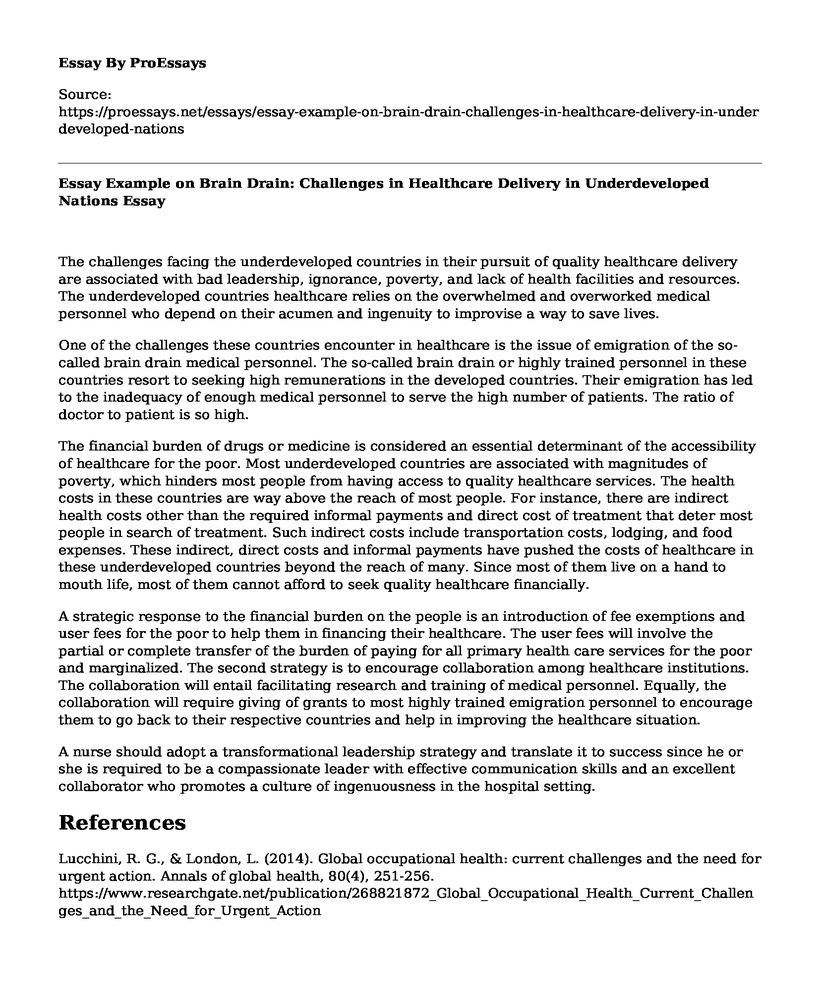The challenges facing the underdeveloped countries in their pursuit of quality healthcare delivery are associated with bad leadership, ignorance, poverty, and lack of health facilities and resources. The underdeveloped countries healthcare relies on the overwhelmed and overworked medical personnel who depend on their acumen and ingenuity to improvise a way to save lives.
One of the challenges these countries encounter in healthcare is the issue of emigration of the so-called brain drain medical personnel. The so-called brain drain or highly trained personnel in these countries resort to seeking high remunerations in the developed countries. Their emigration has led to the inadequacy of enough medical personnel to serve the high number of patients. The ratio of doctor to patient is so high.
The financial burden of drugs or medicine is considered an essential determinant of the accessibility of healthcare for the poor. Most underdeveloped countries are associated with magnitudes of poverty, which hinders most people from having access to quality healthcare services. The health costs in these countries are way above the reach of most people. For instance, there are indirect health costs other than the required informal payments and direct cost of treatment that deter most people in search of treatment. Such indirect costs include transportation costs, lodging, and food expenses. These indirect, direct costs and informal payments have pushed the costs of healthcare in these underdeveloped countries beyond the reach of many. Since most of them live on a hand to mouth life, most of them cannot afford to seek quality healthcare financially.
A strategic response to the financial burden on the people is an introduction of fee exemptions and user fees for the poor to help them in financing their healthcare. The user fees will involve the partial or complete transfer of the burden of paying for all primary health care services for the poor and marginalized. The second strategy is to encourage collaboration among healthcare institutions. The collaboration will entail facilitating research and training of medical personnel. Equally, the collaboration will require giving of grants to most highly trained emigration personnel to encourage them to go back to their respective countries and help in improving the healthcare situation.
A nurse should adopt a transformational leadership strategy and translate it to success since he or she is required to be a compassionate leader with effective communication skills and an excellent collaborator who promotes a culture of ingenuousness in the hospital setting.
References
Lucchini, R. G., & London, L. (2014). Global occupational health: current challenges and the need for urgent action. Annals of global health, 80(4), 251-256. https://www.researchgate.net/publication/268821872_Global_Occupational_Health_Current_Challenges_and_the_Need_for_Urgent_Action
Macfarlane, S., Racelis, M., & Muli-Muslime, F. (2000). Public health in developing countries. The Lancet, 356(9232), 841-846. https://www.ncbi.nlm.nih.gov/pubmed/11022943
Cite this page
Essay Example on Brain Drain: Challenges in Healthcare Delivery in Underdeveloped Nations. (2023, Mar 28). Retrieved from https://proessays.net/essays/essay-example-on-brain-drain-challenges-in-healthcare-delivery-in-underdeveloped-nations
If you are the original author of this essay and no longer wish to have it published on the ProEssays website, please click below to request its removal:
- Research Paper on Rubella
- Paper Example on the Power of Patient Education: Stabilize, Prevent, & Minimize Illness
- Anemia: Pathophysiology, Patient Factors, and Management - Essay Sample
- Improving Quality Health: My Professional Nursing Aspirations - Essay Sample
- Diabetic Patients at Risk: Hypertension & Atherosclerosis - Essay Sample
- Essay Sample on Governor Parson & President Obama Address Corona & Ebola
- Paper Example on Airline Flight 1420: NTSB Report, Causes & Recommendations







